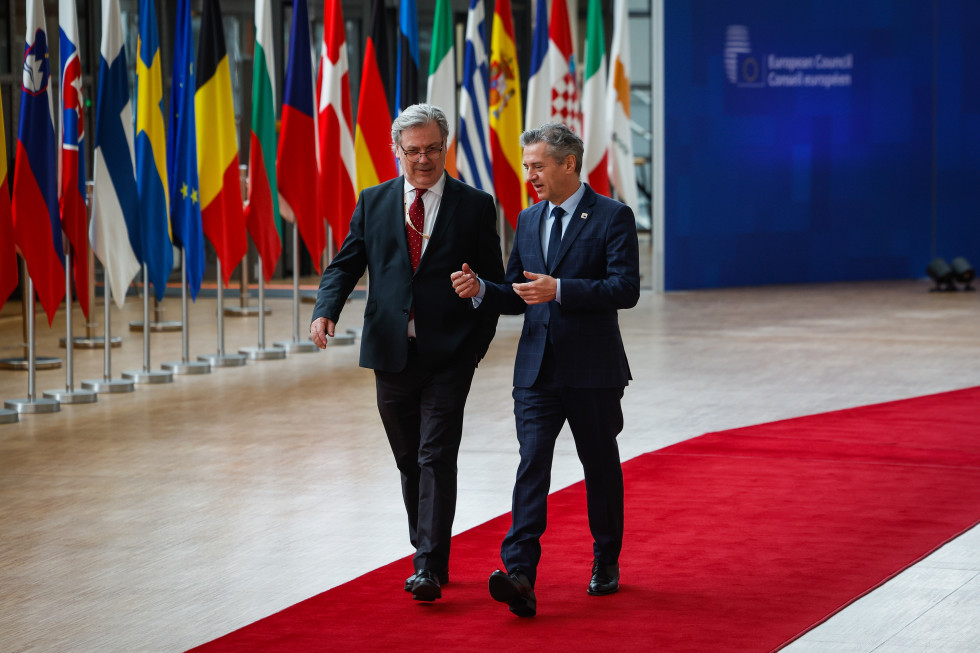Prime Minister Robert Golob: A big victory for Slovenian farmers as well

Prime Minister Robert Golob and State Secretary for National Security Vojko Volk upon arrival at European Council meeting. | Author Anže Malovrh, STA
Also on the basis of the request made by Slovenia at the previous meeting, the European Commission has prepared a package of measures in the field of agriculture, including short-term measures. "And these are the ones that make us happiest," because, according to the Prime Minister, they are the ones that "significantly reduce the administrative burden for small farmers, that is all those who own farmland measuring less than ten hectares. Their share in Slovenia is almost 80%. This is excellent news for Slovenian farmers because it significantly reduces the administrative burden on them to prove that they meet certain criteria. I think this is a big victory for Slovenian farmers as well."
The Prime Minister stressed that it was a question of finding a balance between long-term environmental goals and the option of smart restructuring of the agricultural sector. "Today's conclusions are a compromise between still meeting long-term environmental goals on the one hand and clearly addressing the immediate demands of farmers on the other. That is to say, we have short-term solutions and long-term goals. I think that the compromise is a good one," said Mr Golob. Although the measures still need to be approved by the Council, the Prime Minister is optimistic in his belief that they will be adopted soon. The leaders also discussed how to safeguard the global competitiveness of European farmers.
Historical progress at this summit was also achieved with regard to the European future of Bosnia and Herzegovina. Slovenia welcomes the European Council’s decision to give Bosnia and Herzegovina the green light for the initiation of EU accession negotiations, which Slovenia has worked towards for a long time. This is an important geopolitical decision based on the reforms introduced since Bosnia and Herzegovina was granted the status of candidate country in December 2022, which was recently confirmed by the European Commission. "Since the Commission’s report is positive, I see no reason to delay the opening of negotiations for full membership. I have been advocating for this for the last year and a half," the Prime Minister stated clearly before the meeting. The decision is a new milestone in efforts to achieve progress in Bosnia and Herzegovina and the entire Western Balkans on their EU path.
Prime Ministers of Ireland, Malta, Slovenia and Span met on the margins of the European Council meeting to exchange their views on the situation in Gaza and the Middle East, and welcomed the conclusions reached by the European Council. In a joint statement, they agreed on the urgency of an immediate cease-fire, an unconditional surrender of hostages and a swift, extensive and permanent increase of humanitarian aid in Gaza. They also believe that the only way to achieve lasting peace and stability in the region is the implementation of a two-country solution, with the states of Israel and Palestine living in peace and security. They also discussed their readiness to recognise the State of Palestine, which will be done once the recognition can be effective and the circumstances appropriate.
In the discussion, Slovenia also highlighted the key role of the UN Relief and Works Agency for Palestine Refugees in the Near East (UNRWA) in preventing the complete collapse of the humanitarian system in Gaza. In its conclusions, the European Council expressed horror at the loss of civilian lives and the critical humanitarian situation in Gaza, calling for an immediate humanitarian pause in hostilities that would allow humanitarian aid to be provided and lead to a lasting truce and the unconditional surrender of all hostages.
The leaders again condemned Russia’s aggression against Ukraine, agreeing on a further increase in assistance to Ukraine and its population in defence against the aggression. They welcomed the adoption of a new support package as part of the European Peace Facility. In light of growing security challenges, the European Council called for the improvement of the EU’s defence readiness, including by strengthening the defence industry.

